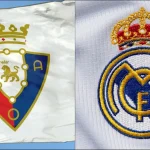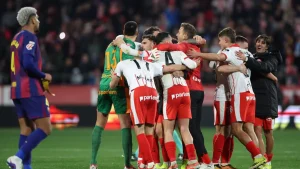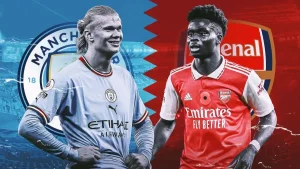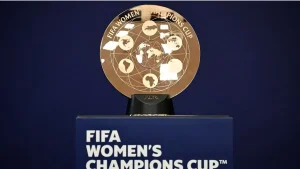Premier League 2025-26
Premier League clubs are not just defined by their players and trophies, they also have unique nicknames that carry history, culture, and identity. These monikers often reflect the club’s founding origins, local industries, or visual characteristics. In this article, we explain the nicknames of all 20 Premier League clubs for the 2025-26 season and explore the fascinating stories behind them.
Premier League 2025-26 Club Nicknames
| Club | Nickname | Origin / Meaning |
| Arsenal | The Gunners | Founded in 1886 by workers from the Royal Arsenal munitions factory in Woolwich, London. The nickname reflects the club’s military origins, and the cannon emblem remains central to the club’s crest and identity. |
| Aston Villa | The Villans | Derived from “Villa Cross Wesleyan Chapel,” where the club’s founders played cricket before forming the football club in 1874. The nickname symbolizes their local roots and early sporting community. |
| Bournemouth | The Cherries | Comes from the cherry-red striped shirts of the team, which were inspired by the club’s early kit colours. The name also reflects the town’s historical association with cherry orchards, making it a fitting local identity. |
| Brentford | The Bees | Adopted in the 1890s by fans chanting “Buckingham Bees” and later shortened to “The Bees.” The nickname highlights the club’s hard-working, buzzing team ethic and is linked to the B initials in Brentford Football Club. |
| Brighton & Hove Albion | The Seagulls | Reflects the club’s coastal location and seaside city of Brighton. Originally, rival fans called the team “Eagles,” and local supporters adopted “Seagulls” in response. It symbolizes agility, freedom, and connection to the seaside environment. |
| Burnley | The Clarets | Named after the club’s claret-colored shirts, introduced in the late 19th century. The nickname not only references kit colors but also Burnley’s pride in its traditional football heritage and continuity through generations. |
| Chelsea | The Blues | Refers to the club’s traditional blue shirts and the strong visual identity associated with Chelsea’s kits. The nickname also conveys loyalty, strength, and the club’s consistent presence at the top levels of English football. |
| Crystal Palace | The Eagles | Inspired by the eagle on the club badge, which itself was drawn from the famous Crystal Palace building in South London. The nickname evokes power, vision, and soaring ambition, reflecting both the city’s and club’s historic symbolism. |
| Everton | The Toffees | Thought to originate from a local toffee shop called Ye Anciente Everton Toffee House near Goodison Park. The nickname represents community roots, sweet local heritage, and a friendly fan culture that has persisted over decades. |
| Fulham | The Cottagers | Named after Craven Cottage, the club’s historic stadium built in 1896 on the banks of the River Thames. The nickname reflects the stadium’s unique riverside architecture and the club’s identity tied to its London locality. |
| Leeds United | The Whites | It comes from the club’s all-white kit, popularized in the 1960s under Don Revie. The nickname symbolizes purity, elegance, and a distinct visual identity, separating Leeds from other English clubs with more colorful kits. |
| Liverpool | The Reds | Inspired by the team’s red kit adopted in 1964 to create a bold identity under Bill Shankly. The nickname also conveys passion, aggression, and a deep emotional connection with the supporters at Anfield and worldwide. |
| Manchester City | The Citizens | Reflects the club’s official title and connection to the city of Manchester. The nickname emphasizes community pride, civic identity, and loyalty to local supporters, distinguishing them from their historic rivals. |
| Manchester United | The Red Devils | Adopted from a French rugby team known as “Les Diables Rouges.” Manchester United embraced the nickname in the 1960s to project a powerful, intimidating, and modern image while highlighting their competitive spirit. |
| Newcastle United | The Magpies | Derived from the club’s black and white striped kit resembling the plumage of a magpie bird. The nickname emphasizes resilience, cleverness, and the dramatic contrast between home and away colours. |
| Nottingham Forest | The Reds | Simple yet iconic, reflecting the team’s red kit. The nickname also carries historical resonance from the club’s successful periods under Brian Clough, including back-to-back European Cups in the late 1970s. |
| Sunderland | The Black Cats | Believed to originate from local folklore about black cats bringing luck, as well as the club’s black kit accents. It symbolizes resilience, superstition, and the team’s fighting spirit. |
| Tottenham Hotspur | The Lilywhites | Refers to the club’s traditional white shirts introduced in 1898. The nickname evokes purity, elegance, and a strong visual identity associated with Tottenham’s style and history in English football. |
| West Ham United | The Hammers | Originates from Thames Ironworks, the company that formed the club in 1895. The nickname represents the working-class roots of the team, the hammers used by local shipbuilders, and the club’s historical identity in East London. |
| Wolverhampton Wanderers | Wolves | Derived from the club’s full name and the city’s association with wolves. The nickname emphasizes strength, agility, and a fierce competitive nature, resonating with the team’s identity since its founding in 1877. |
Why Club Nicknames Matter
Club nicknames provide a window into football history, culture, and identity. They:
- Preserve historical roots and local culture.
- Strengthen fan identity and community pride.
- Offer memorable shorthand for commentators, media, and merchandise.
- Connect past generations of fans with the present.
For example, “The Red Devils” instantly evokes Manchester United’s competitive image, while “The Toffees” reminds fans of Everton’s friendly, community-oriented heritage.
The Premier League’s 2025-26 season is not only about matches and trophies but also about the rich stories behind each club. From Arsenal’s military-inspired “Gunners” to Wolverhampton Wanderers’ fierce “Wolves,” these nicknames are steeped in history, tradition, and local pride. Understanding them gives fans a deeper appreciation of England’s most competitive football league.
FAQs
Q1. Why is Arsenal called “The Gunners”?
A. The nickname reflects Arsenal’s foundation in the Royal Arsenal munitions factory and has been central to the club’s identity ever since.
Q2. Where does Manchester United’s “Red Devils” nickname come from?
A. It comes from a French rugby team known as “Les Diables Rouges,” symbolizing power, intimidation, and a modern competitive image.
Q3. Why are Everton called “The Toffees”?
A. It likely originates from a local toffee shop near Goodison Park, reflecting the club’s community roots and heritage.
Q4. Which club is nicknamed “The Magpies”?
A. Newcastle United, due to their black-and-white striped kit resembling a magpie bird.
Q5. What is the origin of West Ham’s “Hammers”?
A. It comes from Thames Ironworks, the company that formed the club, and symbolizes the working-class roots and shipbuilding heritage of East London.
Also Read- Liverpool Edge Atlético Madrid In Stoppage-Time Thriller At Anfield















